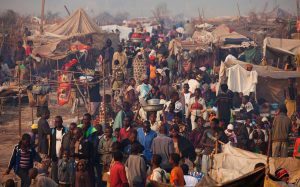 The U.N. refugee agency reported Tuesday that nearly 69 million people who have fled war, violence and persecution were forcibly displaced last year, a record for the fifth straight year.
The U.N. refugee agency reported Tuesday that nearly 69 million people who have fled war, violence and persecution were forcibly displaced last year, a record for the fifth straight year.
The U.N. High Commissioner for Refugees said the continued crises in places like South Sudan and Congo, as well as the exodus of Muslim Rohingya from Myanmar that started last year, raised the overall figure of forced displacements in 2017 to 68.5 million.
Of that total, 16.2 million were newly displaced last year — an average of more than 44,000 people per day. Most have been displaced for longer than that, some forced to flee multiple times.
“The global figure has gone up again by a couple of million,” said the High Commissioner, Filippo Grandi. “This is because of protracted conflicts and lack of solutions for those conflicts that continue, continuous pressure on civilians in countries of conflict that pushed them to leave their homes and new or aggravating crises, like the Rohingya crisis.”





Your TV very very good